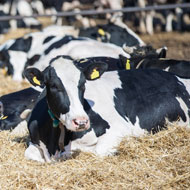
Significant reduction in methane emissions
Targeted use of hormone treatments could make the dairy industry more efficient and cut greenhouse gas emissions, according to research by the University of Nottingham.
The research, published in PLOS ONE, suggests that routine hormone treatments could improve efficiency by getting more cows pregnant sooner
Dr Simon Archer, who led the study said: "This is better for the environment as for every litre of milk produce; fewer animals would be needed, which generates less waste. This applies for any breed of cow and to the majority of farms, except those that are already exceptionally well-managed."
Scientists predict that by 2050, the growth in the size and wealth of populations will lead to an unprecedented demand for animal produce. Due to limitations on natural resources, the rise in agricultural productivity needed to meet this demand must be environmentally sustainable.
One way to meet these objectives is to carry out routine hormone treatments in dairy cows to aid reproduction, however the practice has raised ethical concerns. It is therefore important that their use can be justified.
Dr Archer and his team carried out a computer simulation of individual cows from 10,000 dairy herds to compare traditional reproduction management with what may happen if routine hormone treatment programmes were adopted for a short time when cows first became eligible to breed.
They found that for an 'average' UK herd there would be a reduction in methane emissions equivalent to the global warming potential of two cars, a family home, or 21 barrels of oil.
"The farmer would also save at least £50 per cow in production costs," added Dr Archer.
The study concluded that the routine hormonal treatments tested would be financially viable on many farms and would also benefit society by reducing global warming and ensuring the continued availability of affordable milk.



 FIVP has shared a survey, inviting those working in independent practice to share their views on the CMA's proposed remedies.
FIVP has shared a survey, inviting those working in independent practice to share their views on the CMA's proposed remedies.